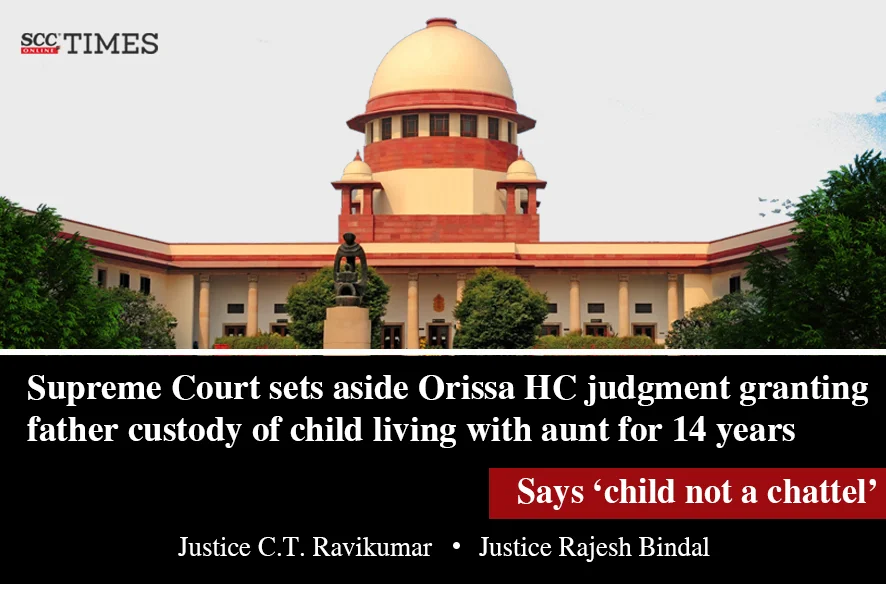Supreme Court: In an appeal filed against the judgment of the Orissa High Court, wherein the Court directed the Registrar of the Court to recover the child from the custody of the sister of the child, particularly from her aunt and uncle and to hand over to the father, the division bench of C.T. Ravikumar and Rajesh Bindal, JJ. while setting aside the impugned Judgment, said that the child cannot be treated as a chattel at the age of 14 years to hand over her custody to the father, where she has not lived ever since her birth. Stability of the child is also of paramount consideration.
The father submitted that he left the child with her grandmother due to the financial difficulty he was facing. He further submitted that there is no system of adoption of child in Mohammaden law. It is only Kafalah, in terms of which only custody can be given to another person, however, the child does not sever relations with biological parents.
The Court noted that the child is 14 years old, living since birth with her aunt and uncle. The Bench also noted that it is not a case in which any of the parties is claiming adoption which otherwise is not permissible under Mohammedan law. Guardianship is also not being claimed. It is only the dispute regarding custody of the child.
The Court examined the legal position on custody. It took note of Athar Hussain v. Syed Siraj Ahmed, (2010) 2 SCC 654 wherein it was held that the question of custody is different from the question of guardianship. Father can continue to be the natural guardian of the children; however, the considerations pertaining to the welfare of the child may indicate lawful custody with another friend or relative as serving his/her interest better.
It also referred to Nil Ratan Kundu v. Abhijit Kundu, (2008) 9 SCC 413 , wherein the principles governing custody of minor children were laid down and it was held that welfare of the children is to be seen and not the rights of the parties.
Further, it reiterated that welfare of the child is of paramount consideration and not personal law and statute.
Further, after interacting with the child, the Court said that the child is intelligent, who could understand her welfare, and she is happy with the family where she has been brought up. She does not wish to be destabilized.
The Court said that the fact that when custody of the child was handed over to the aunt, she was un-married and is now married having two children will also not be a deterrent for this Court to come to the conclusion that best interest of the child still remains with the aunt as the child is living with her ever since she was 3-4 months old and is now about 14 years of age having no doubt in her mind that she wishes to live with them.
The Court viewed that the welfare of the child lies with her custody with the aunt and uncle. This is coupled with the fact that even she also wishes to live there. Keeping in view her age, the Court said she can form an opinion in that regard. Further, it remarked that the child cannot be treated as a chattel at the age of 14 years to hand over her custody to the father, where she has not lived ever since her birth. Stability of the child is also of paramount consideration.
[Shazia Aman Khan v. State of Orissa, 2024 SCC OnLine SC 225, decided on 04-03-2024]







